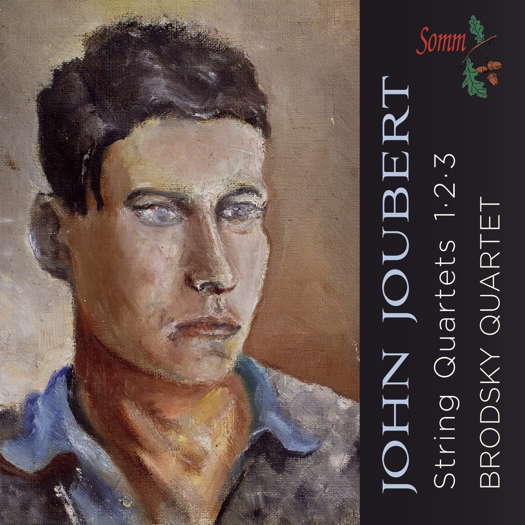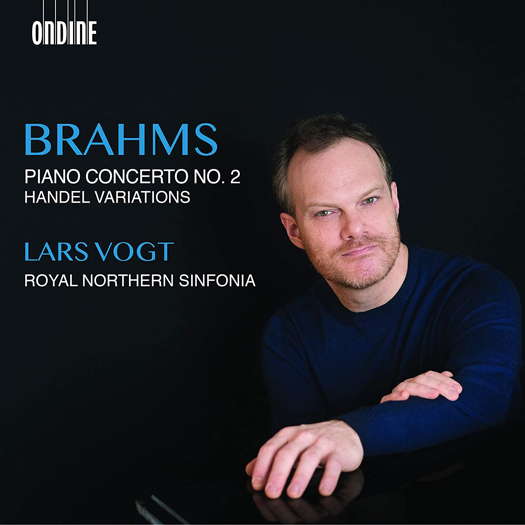 CENTRAL ENGLAND: Mike Wheeler's concert reviews from Nottingham and Derbyshire feature high profile artists on the UK circuit - often quite early on their tours.
CENTRAL ENGLAND: Mike Wheeler's concert reviews from Nottingham and Derbyshire feature high profile artists on the UK circuit - often quite early on their tours.
 DISCUSSION: John Dante Prevedini leads a discussion about Composers, individuals or collective?, including contributions from David Arditti, Halida Dinova, Robert McCarney and Jane Stanley.
DISCUSSION: John Dante Prevedini leads a discussion about Composers, individuals or collective?, including contributions from David Arditti, Halida Dinova, Robert McCarney and Jane Stanley.
 SPONSORED: CD Spotlight. A Fascinating Recording - John Joubert's string quartets, heard by Alice McVeigh.
SPONSORED: CD Spotlight. A Fascinating Recording - John Joubert's string quartets, heard by Alice McVeigh.
All sponsored features >>

Distinctly Continental
PATRICK MAXWELL listens to Brahms from
Lars Vogt and the Royal Northern Sinfonia
'Vogt's piano playing relishes each intricacy of this music, which is so filled with motifs and constant expression.'
The music of Brahms is at different times plaintive, tempestuous, exuberant or solemn, yet always Romantic and distinctly continental. Perhaps it was the mixture of perfect timing and situation; Germany and the late nineteenth-century - but Brahms' music is still always highly original and recognisable.
It took longer than was needed for the music of Brahms and his contemporaries to be accepted in England however; 'Das Land ohne Musik' favoured the more passionate, dillentantish Russians of the nineteenth century to the supposedly cold, academic Germans. The English music scene, before its renaissance under Parry, Stanford and Elgar later in the century, let this prejudice stifle the influence of the intellectual centre of late Romanticism, and obscured the names of some of its most brilliant practitioners until their influence was heard so powerfully in the work that gradually morphed to create a unique resonance that was originally English. There was, of course, the powerful, overarching influence of Wagner, championed by figures in Britain such as Parry's teacher Edward Dannreuther, but the popularity of others came in only the briefest glimpses of the masterful style that the era possessed. (Anyone for Bruch's Second Violin Concerto?) That composer's most famous piece meant that for some time he had to be content with the status that Pachelbel and Holst have had to endure: of being almost simply one-hit wonders with a treasure trove of music left largely undiscovered by popular audiences.
Left to the occasional recording and the domain of the more instructive professional is the music of composers such as Friedrich Kiel, Friedrich Gernsheim and Carl Reinecke. Kiel was the composer of some of the most brilliant chamber works of the century, particularly for strings and piano, Gernsheim wrote impeccable music that was heavily influenced by Brahms and Bruch, and Reinecke was, like the others, a conservative, and taught Stanford in Leipzig (although his pupil castigated him for 'having no enthusiasm of any sort' especially around more modern composers, including Wagner, whom he 'loathed').
What then, in this English context of anti-intellectualism, made Brahms the exception in being able to cut through to enjoy the large audiences he astounds today? On the one hand, he was highly prolific, and not a pedagogue who took teaching more seriously than composing like many of his near-contemporaries. His oeuvre is evidently more impressive, fulfilling not just the fashion for chamber music, but also the magisterial symphonies, variations and choral works. It is hard to imagine any of the other composers mentioned composing works anywhere near the magnitude and majesty of Ein Deutsches Requiem and the First Symphony. His enduring popularity and originality stem from this other-worldliness that went beyond the structural and theoretical brilliance that others showed, and created the authentic sound world that we can recognise so vividly today.
This new recording from the Royal Northern Sinfonia sees Lars Vogt as both conductor and soloist, taking the lead for Brahms' Second Piano Concerto, Op 83, and the solo Variations and Fugue on a Theme by Handel, Op 24. The Second Piano Concerto was first performed twenty-two years after his First, and shows a technical maturity that is innate in his later works.
The first movement opens with a horn call that sets the tone for much of the long movement; a plaintive melody that is used both in a simplistic form and in some of Brahms' most boisterous and triumphant orchestral developments, and the most engrossing piano lines.
Listen — Brahms: Allegro non troppo (Piano Concerto No 2 in B flat, Op 83)
(track 1, 0:02-0:56) © 2020 Deutschlandradio / Ondine Oy :
It is all carried off with the contrasts of emotions that are needed from both orchestra and soloist, and both make use of their different roles in the piece, with the piano used as an instrument for improvisation and as a response to the melodies and expositions of the orchestra, before the two blend part way through the first movement.
The second movement, Allegro appassionato, showcases some of Brahms' best tempestuous music, and some of his finest blends of the expansive and tender music, in such an impressive stylistic score. Vogt's piano playing relishes each intricacy of this music, which is so filled with motifs and constant expression.
Listen — Brahms: Allegro appassionato (Piano Concerto No 2 in B flat, Op 83)
(track 2, 0:00-0:59) © 2020 Deutschlandradio / Ondine Oy :
Steffan Morris is an exquisite cellist in the Andante third movement; Vogt says that in this movement the cello is 'a newly introduced character' who 'takes the pianist by the hand and hums ... a simple melody of folk-song character'. This movement brings together a wonderful exchange where both instruments seem to hang off the other in a musical exchange of some beauty.
Listen — Brahms: Andante (Piano Concerto No 2 in B flat, Op 83)
(track 3, 0:00-0:49) © 2020 Deutschlandradio / Ondine Oy :
The final movement, Allegretto grazioso, is a scintillating finale that has the piano part at almost Mozartian tendencies.
The genius of Brahms' variation writing is his ability to incorporate an old theme and make it seem simultaneously authentic to the original composer and style, in this case the Baroque, whilst also distinctly original on his part, and adding a definite Romantic edge to the music. Vogt plays the Variations and Fugue on Handel with a deft touch of quality that enhances the seemingly simple nature of these incredibly detailed pieces.
Listen — Brahms: Variation 1 (Variations and Fugue on a Theme by Handel, Op 24)
(track 5, 0:51-1:29) © 2020 Deutschlandradio / Ondine Oy :
This fine recording shows the brilliance of Brahms' orchestration and pianistic genius, which helped him to surpass his contemporaries in recognition and compositional virtuosity. These pieces, sublime in their intensity and buoyancy, deserve many more future happy partners and loyal friends.
Copyright © 30 May 2020
Patrick Maxwell,
Buckinghamshire, UK

CD INFORMATION: BRAHMS - LARS VOGT
FURTHER INFORMATION: JOHANNES BRAHMS
FURTHER INFORMATION: ONDINE RECORDS


